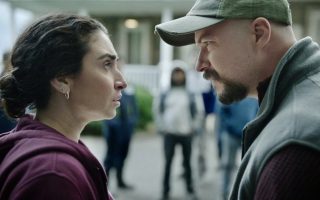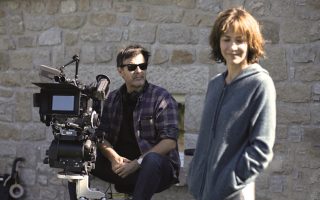Exclusive Interview: Marion Cotillard in “Gueule d’Ange”
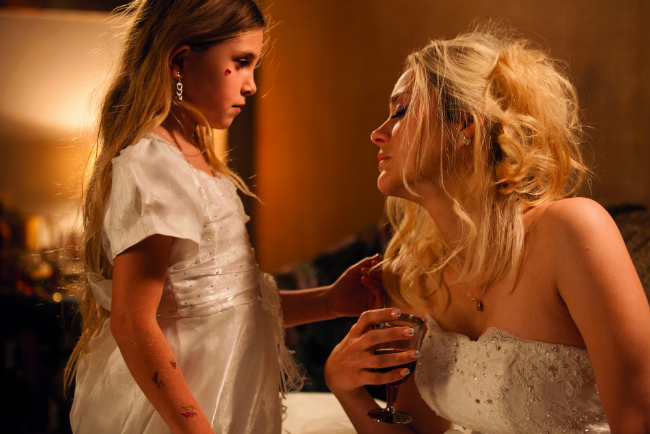
No stranger to challenging roles, in her latest film Marion Cotillard plays a rudderless single mother running away from her responsibilities. She tells Lanie Goodman how she tackled the elusive character…
Marion Cotillard is sitting in a corner of a hotel’s piano bar in Cannes, hugging a little girl whose face is buried in her arms. The eight-year-old actress Ayline Aksoy-Etaix, her co-star in Gueule d’Ange, has come to say goodbye, while her parents hover about, smiling apologetically. An unexpected cloudburst has flooded the rooftop lounge of this five-star hotel and this is the only dry space available. The cramped room turns very quiet; the journalists discreetly look away, shuffling their papers or fiddling with their smartphones.
In Vanessa Filho’s first feature film, Gueule d’Ange (Angel Face), which debuted at the Cannes Film Festival in Un Certain Regard, Cotillard plays Marlène, a single mother who lives with her daughter in a low-income seaside flat overlooking the beach on the Riviera. “Everything is going to be fine,” she tells Elli in the opening scene as she slides into bed with her visibly drunk after another night of excessive partying. She is still wearing her shiny, skin-tight dress and full make-up with glued-on spangles. She is smearing lipstick on the pillowcase.
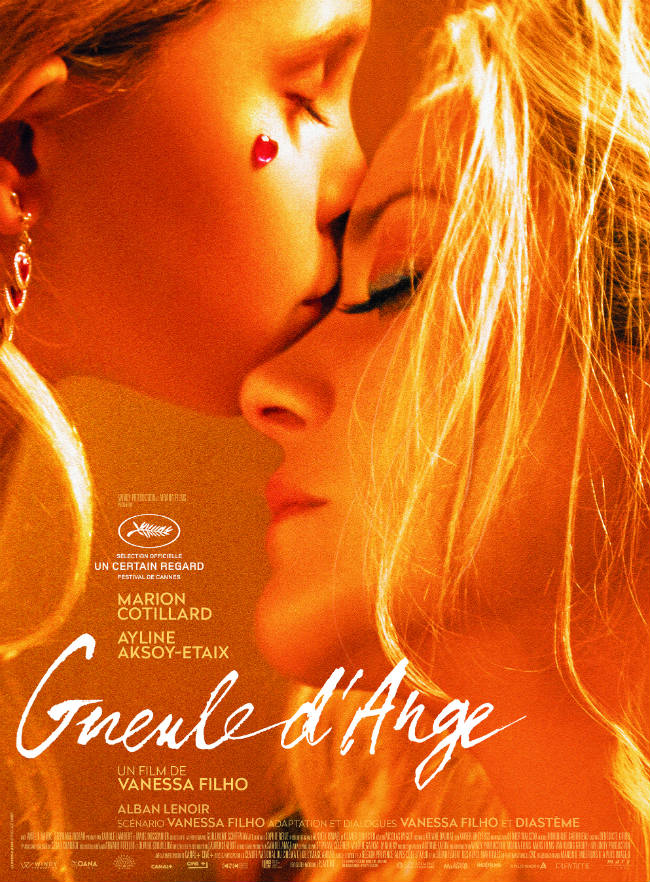
© GUEULE D’ANGE – MARS FILMS
It’s the night before her wedding day and the audience senses already that Marlène – a bleached blonde addicted to daytime TV shows – is not the best mother in the world and will probably blow her chance to give her daughter a stable home.
“I’m a little emotional today,” Cotillard apologises with a little laugh, her eyes brimming with tears – real tears – as she climbs onto the barstool chair for the next round of interviews. “It’s hard when you form a new family in a film,” she says. “And for a kid it’s even stronger because it’s the end of a very strong relationship. We are used to it. Sometimes you never see the people you worked with again.”
Her English is slow and deliberate, as if she were always weighing her words. It’s hard not to be mesmerised by her flawless skin, whose light the camera captures so perfectly in Angel Face.
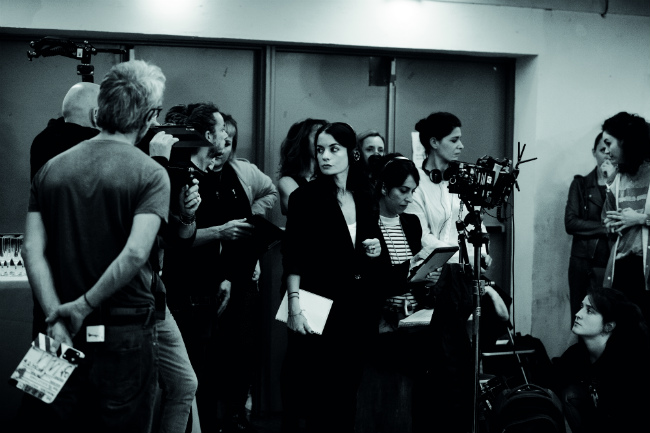
Vanessa Filho on the set of her feature debut. © GUEULE D’ANGE – MARS FILMS
Gorgeously shot by The Artist cinematographer Guillaume Schiffman, Angel Face offers a rare glimpse of the seedier side of the sun-soaked Riviera. It also provides Cotillard (one of France’s most elegant icons and one of the faces of Lady Dior), the chance to explore new ground. Some critics have compared her role to a French version of a “white trash” misfit, whose boozy habits and garish outfits bring scornful sniggers from the other mothers at her daughter’s school.
But then, glamour isn’t everything. Ever since Cotillard’s moving Oscar-winning performance as the struggling street singer Édith Piaf in Olivier Dahan’s 2007 biopic La vie en rose, the actress has continued to take on complex roles – a challenge that reveals her ability to internalise the most sombre depths of a character in all her frailty.
In Angel Face, the perils of fragility are explored in the character of Marlène, who constantly sabotages herself by making the worst possible choices – choices that push her into ever deeper distress. At her own wedding, for example, the bride drunkenly belts out a raunchy song at the party, then slips into the kitchen to have sex with one of the groom’s guests. Her husband, played by Stéphane Rideau, soon calls it quits and Marlène is back on her own. Though she has panicked bursts of affection for Elli, she is oblivious to the fact that her daughter (whom she affectionately calls ‘angel face’) is copying her only role model: her little angel is wearing make-up at school, feeding bourbon to her stuffed animals and taking nips of alcohol from unfinished glasses she finds in cafés.
“I think Marlène is the classic pattern of a woman who thinks she doesn’t deserve love and throws it all away,” Cotillard says. “It’s based on how you consider yourself: if you think you don’t deserve happiness because you’re not loveable, then you break something beautiful. You don’t know how to keep and cherish it.”
HEARTFELT PERFORMANCE
In spite of Cotillard’s heartfelt performance, your empathy may wear thin when Marlène abandons her child to go off with another possible suitor. Meanwhile, Elli attaches herself to a new parental figure, a solitary but sweet-natured cliff diver, played by Alban Lenoir, whom she happens to meet while wandering at night on the boardwalk.
“I can totally understand why some people in the audience would want to give Marlène a good shake,” Cotillard concedes with a little laugh. “But I choose not to judge her. I don’t need to identify with the characters, just to understand them. And most of the time when I’m exploring a personality – a heart, a soul – I find some love for them. So, if I ever were to meet Marlène, I would want to take her in my arms and help her find a way to love herself.”
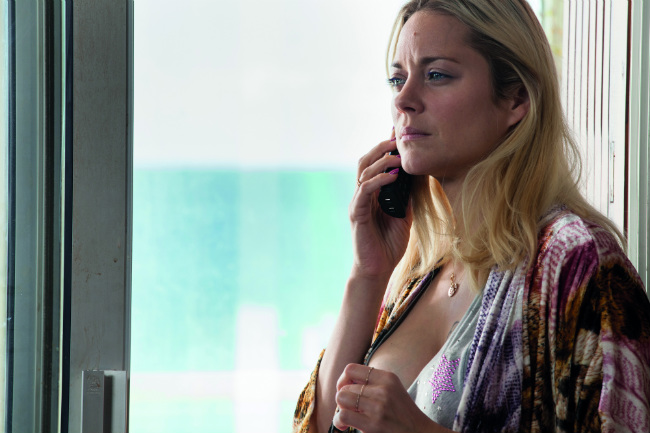
Marion Cotillard in “Angel Face”. © GUEULE D’ANGE – MARS FILMS
To prepare for the role, Marion Cotillard spent many long hours with director Vanessa Filho discussing a web of back stories that would account for each character’s behaviour.
“It’s part of the work you have to do when certain things are not explained in the movie. Vanessa and I talked about Marlène – her childhood, her relationship with her own mum, whether her dad was still alive, or whether she had brothers or sisters. That became the base that I used to create more things in her life, things that I didn’t even need to share with Vanessa. For Marlène, I needed to know what was in her mind and where it came from – her fears, her joys, her tastes, how she reacts to music, to food. This is something that I love to do. It’s the only way to give flesh and blood and depth to a character.”
The shimmering palette of colours of the cinematography were also important in the film.
“Vanessa had a very precise vision of how Marlène was dressed and made-up, and I agreed with everything – the tattoos, the colour of her hair, and all the outfits. It’s as if she needed to put shine on herself for protection because she’s not capable of finding any inner light. The paradox is that you want to be seen, but at the same time that reflection can alienate the people who are watching you.”
With regard to her own view about motherhood, Cotillard, who has two young children with her actor-director partner Guillaume Canet, says she is very protective of her seven-year-old son Marcel and baby daughter Louise, but trusts her instinct that they will live their own lives with a sense of freedom. “They teach me maybe even more than I can teach them,” she says with a smile.
ON THE HORIZON
Following on from the success of her partner’s 2010 ensemble piece Little White Lies, Cotillard is teaming up once again with Canet for his sixth feature film, Nous finirons ensemble (We’ll end up together), a kind of comedy sequel. The star-packed cast also includes François Cluzet, Benoît Magimel, José Garcia and Gilles Lellouche.
“I feel very lucky to work with him,” Cotillard says. “And it’s not just because I love him that I love his cinema. We are very honest – and sometimes hard – with one another. This movie will really be focused on the relationships and interactions of feelings between friends, but also on how to accept the evolution of other people’s lives.”
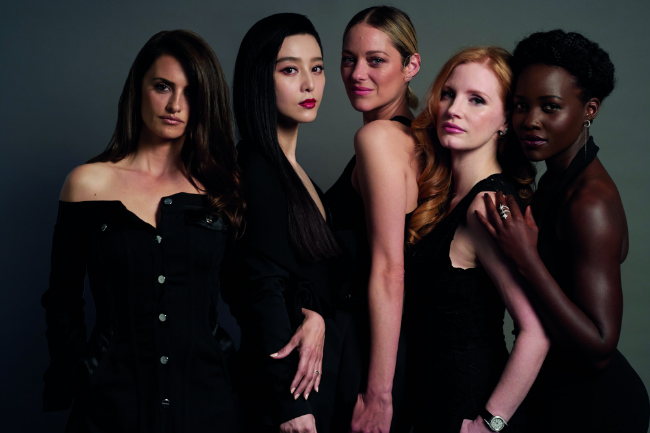
Marion Cotillard is also set to star in Simon Kinberg’s new spy thriller 355 alongside (from left to right) Penélope Cruz, Fan Bingbing, Jessica Chastain and Lupita Nyong’o. Photo: Greg Williams
Another Cotillard film on the horizon is 355, an international, female-driven spy thriller directed by Simon Kinberg that will see Cotillard star alongside Jessica Chastain, Penélope Cruz, Fan Bingbing and Lupita Nyong’o in what promises to be a heady mix of James Bond and Jason Bourne suspense. The actresses will be playing spies who come together to stop a global organisation from thrusting the world into chaos.
“355 isn’t intended to be a feminist film,” says Cotillard. “It’s basically an entertaining movie with very deep subjects and very strong female characters – something you don’t often see in a spy movie. But it’s not a pure comedy like a Melissa McCarthy movie; it will have more realism but some fun as well.”
Judging by her radiant presence in such a wide range of films, Cotillard seems to set no limits on the roles she is willing to tackle, or the directors she is prepared to collaborate with. She has already worked with some of the world’s most prominent directors – Tim Burton, Ridley Scott, Michael Mann, Christopher Nolan, Jacques Audiard, to name but a few – but she insists her starring role in Vanessa Filho’s debut film was equally enriching.
“I always keep something from an encounter with a director,” she muses, gazing out of the rain-speckled window of the hotel’s piano bar. “I haven’t explored everything I need to explore for a wider understanding of the human soul. And that’s something I want and need to share.”
From France Today magazine
Share to: Facebook Twitter LinkedIn Email
Leave a reply
Your email address will not be published. Required fields are marked *

